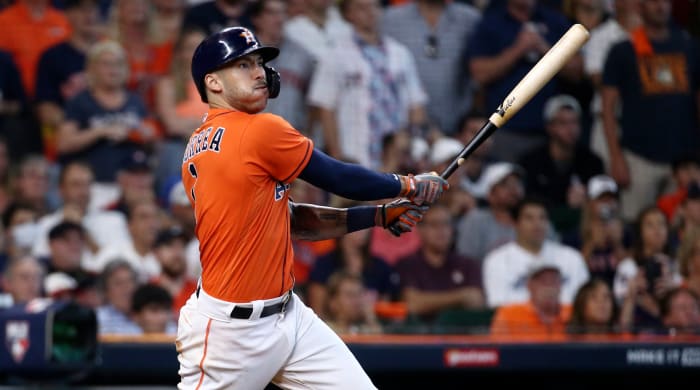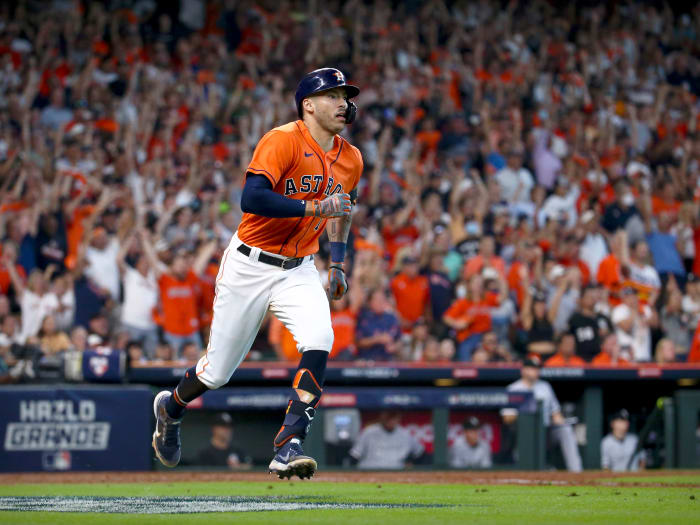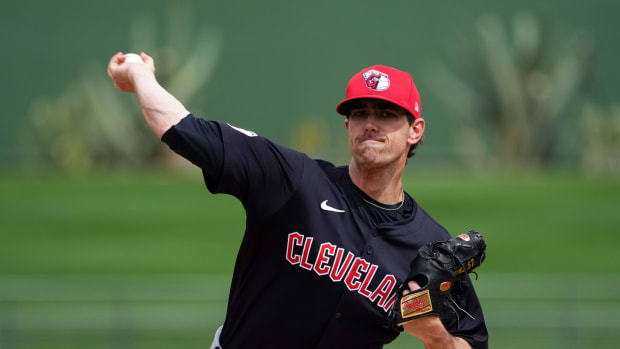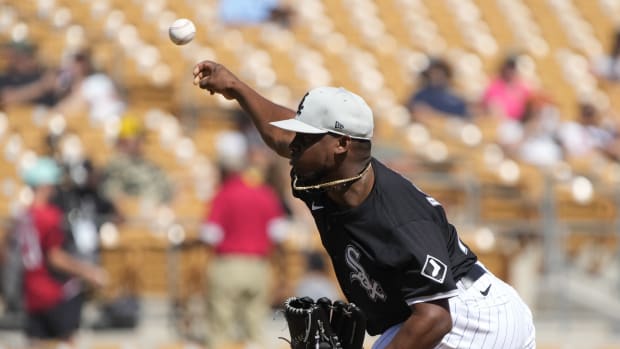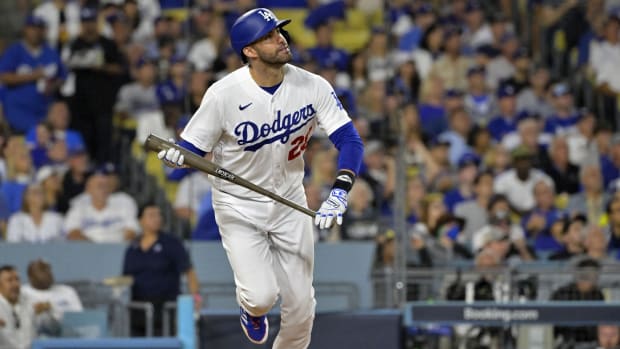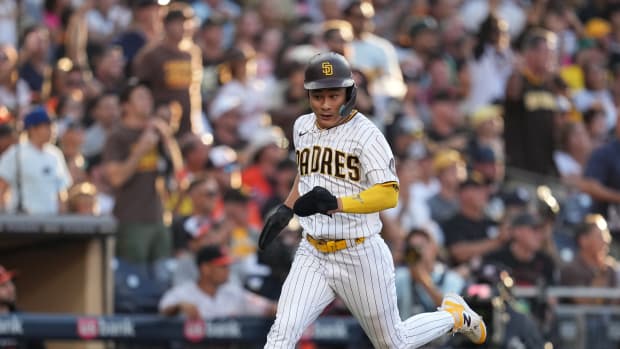Why the Astros Are So Dangerous in the Postseason
HOUSTON – This is a story that helps explain why the Astros are one win from their fifth straight American League Championship Series, and why they have a .584 postseason winning percentage since 2015, when Carlos Correa and Jose Altuve first hung their shingle over the middle infield. It is also a story of why experience matters in the cauldron of October.
ALDS Game 2 on Friday was late and in the balance, and because this is October that meant it was most likely going to swing the way of the Astros. It was a matter of who and when in the deepest, best, most contact-heavy lineup in baseball. It was not, however, going to happen on the ginormous swing Correa took at a 2-0, 98-mph fastball at the top of the zone from White Sox reliever Craig Kimbrel.
Too big! Be short! Be short! Correa told himself after his miss.
Kimbrel was one out away from getting the White Sox off the field with just a 5–4 deficit going into the eighth inning. Kimbrel is part of the best strikeout bullpen in the league. Kimbrel was going to muscle his way out of trouble with a series of high-octane hitters up in the zone, just like the one he blew past Correa.
Kimbrel tried another such pitch, but missed outside. Correa composed himself and came up with a game plan right there in the box.
Swing two baseballs above where you see the ball, he told himself.
As he explains later, “I knew Kimbrel’s fastball has a lot of rise. I had just gotten too big with my swing before that. So I told myself to swing above the ball. Where you see the ball, swing two baseballs above it. That forces you to get on top.”
Correa had a similar thought in Game 2 of the 2017 ALCS against Yankees relief ace Aroldis Chapman. That time, Chapman threw a fastball down and Correa scalded a double off the wall in right field, walking off the Yankees.
Kimbrel was not going to get beat on a fastball down. He reached back and threw the same fastball to the same spot where Correa had whiffed badly on the 2-0 count: tucked into the top corner of the strike zone, away. That pitch in that spot is so wicked that Kimbrel had not allowed an extra-base hit on it in more than five years—since Aug. 20, 2016. Since then, batters managed three singles in 51 at bats on that pitch, for a batting average of .059.
Kimbrel did not miss his spot. The pitch came boring in at 98 mph. Correa saw it and aimed a quick, short stroke two baseballs above where he saw the ball. He connected so solidly that right fielder Leury García chased the ball like a man who just had his fedora blown off in a swirling windstorm. He turned one way and then another, but by then the ball was over his head and off the wall. Two runners scored. Game essentially over. Kyle Tucker followed with a home run, setting what would be a deceiving final score of 9–4.
Correa had faced Kimbrel only three times, all way back in 2016, with one hit. Incredibly, that one hit was a double that turned around the right fielder (Mookie Betts) and clanked off the wall. And it happened on a 3-1 fastball. And it happened two pitches after Correa missed a 2-0 fastball with too big of a swing.
The White Sox have discovered two truths that many teams have learned the hard way over the past five Octobers and then some:
1. You are not going to beat the Astros with fastballs.
2. They are going to draw on their deep experience of so many Octobers to slow the game down.
Correa’s game-planning in the batter’s box in the heat of the moment is emblematic of how the Astros play the game not only with skill but also with smarts. They don’t have the championships of the late 1990s Yankees, but they are forged by so much postseason experience that they have a similar blast furnace of confidence that carries them through big moments.
“Relentless,” Correa says in describing how Houston plays offensive baseball.
Sign up to get the Five-Tool Newsletter in your inbox every day during the MLB playoffs.
Correa and Altuve, who covered more ground than the tarpaulin with his sprawling defensive gems in Game 2, have played in 65 postseason games. Joining them in the lineup were Alex Bregman and Yuli Gurriel (59 games each), Michael Brantley (40), Martín Maldonado (29), Tucker (24) and Yordan Alvarez (20).
It helps, too, that they devour velocity. Houston hitters never get off the fastball. Whether it’s the four-seamer of Lance Lynn, the high, rising heater of Kimbrel or the nasty left-handed sinker of Aaron Bummer, the Astros are always ready to hit the fastball. Preceding Correa’s game-breaking double were three well-struck singles off Bummer’s sinkers, tying a season high for Bummer.
In two ALDS games the Astros are hitting .387 against fastballs from the White Sox. Teams love to lean into velocity in the postseason. This much is true in October: velocity goes up, batting average goes down:
Fastballs, 2017-21
| Avg. Velocity | Batting Avg. | |
|---|---|---|
Regular Season | 92.6 mph | .270 |
Postseason | 93.8 mph | .248 |
This rule of thumb actually plays into Houston's hands. The Astros have hit .267 against fastballs in those years in the postseason—19 points better than the postseason average. The harder they throw at Houston, the more the Astros prosper.
The Astros are 38–27 in postseason games since 2015, all with Correa and Altuve, and including a 7–3 record in one-run games.
The double by Correa just happened to be the biggest of many reminders of why the Astros succeed in October. Manager Dusty Baker called this kind of attention to detail “stacking pennies.” On a day when Correa said Chicago pitcher Lucas Giolito had “nasty stuff,” Houston bled five walks out of him, tying his season high. Giolito kept walking off the back of the mound like a man drumming his fingers on a table while stuck on the Sunday New York Times crossword. You could almost hear him thinking, How do I get these guys out? A 10-letter word for oppressively constant? Relentless.
Tucker made a clutch running catch in right field. Maldonado made two key blocks of curveballs from Framber Valdez with two on in the third, and then dared call another curve to strike out José Abreu.
Before you knew it, the stack of pennies had grown into a tower. It is the Houston way.
More MLB Coverage:
• Kris Bryant's Giant Relief
• NLDS Predictions: Dodgers or Giants? Braves or Brewers?
• Lance McCullers Jr. Is Emerging as a True Playoff Ace
• The Yankees Are Simply a Step Behind






























